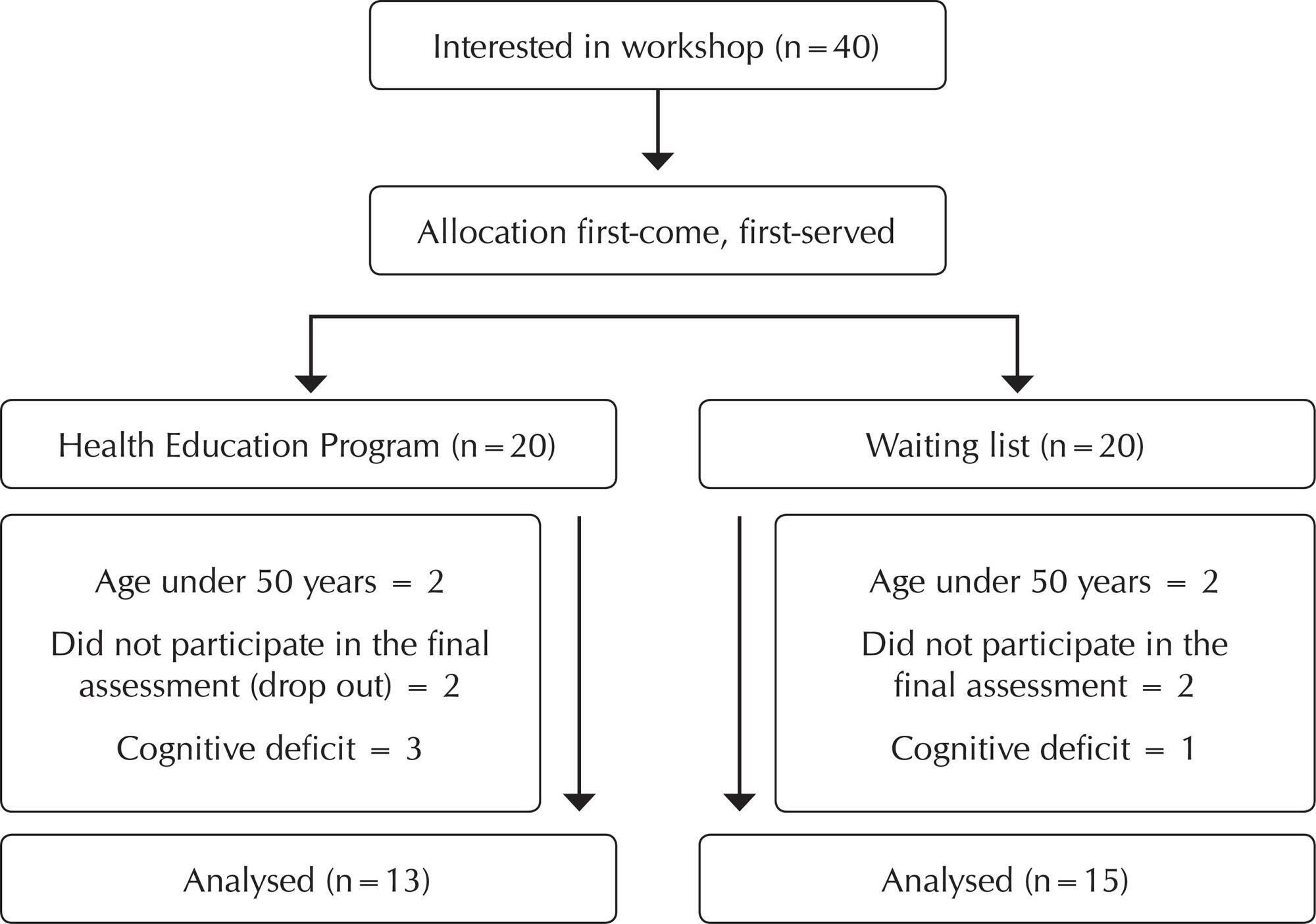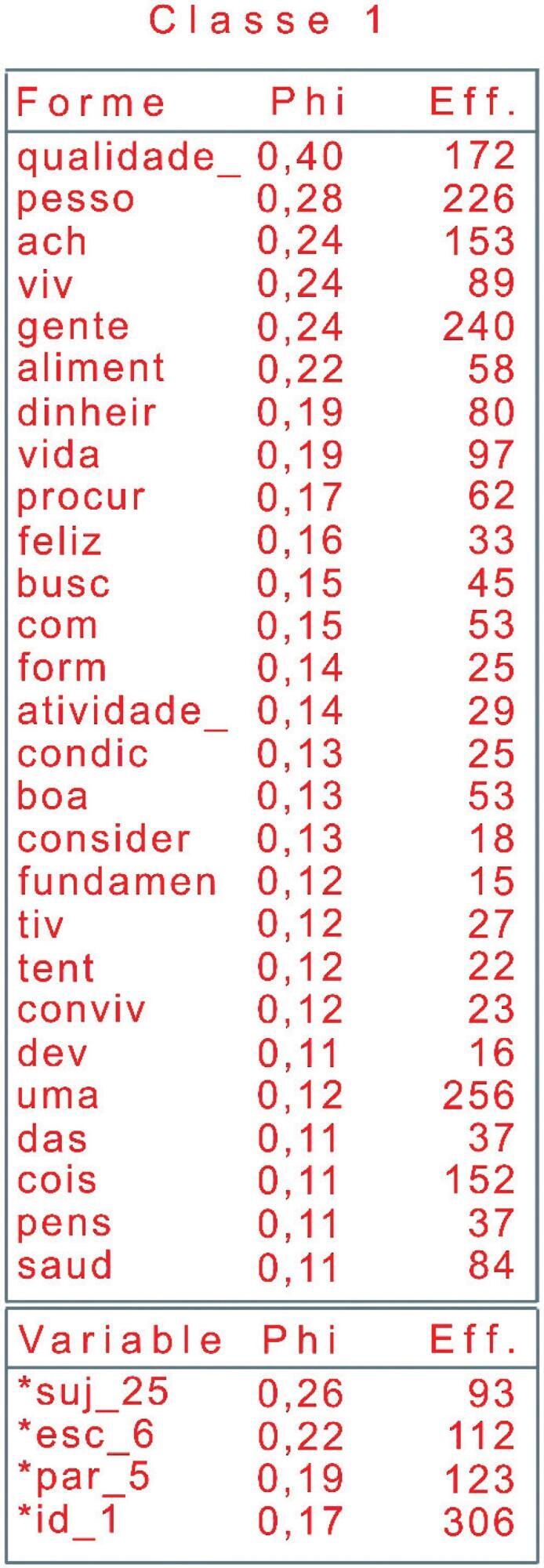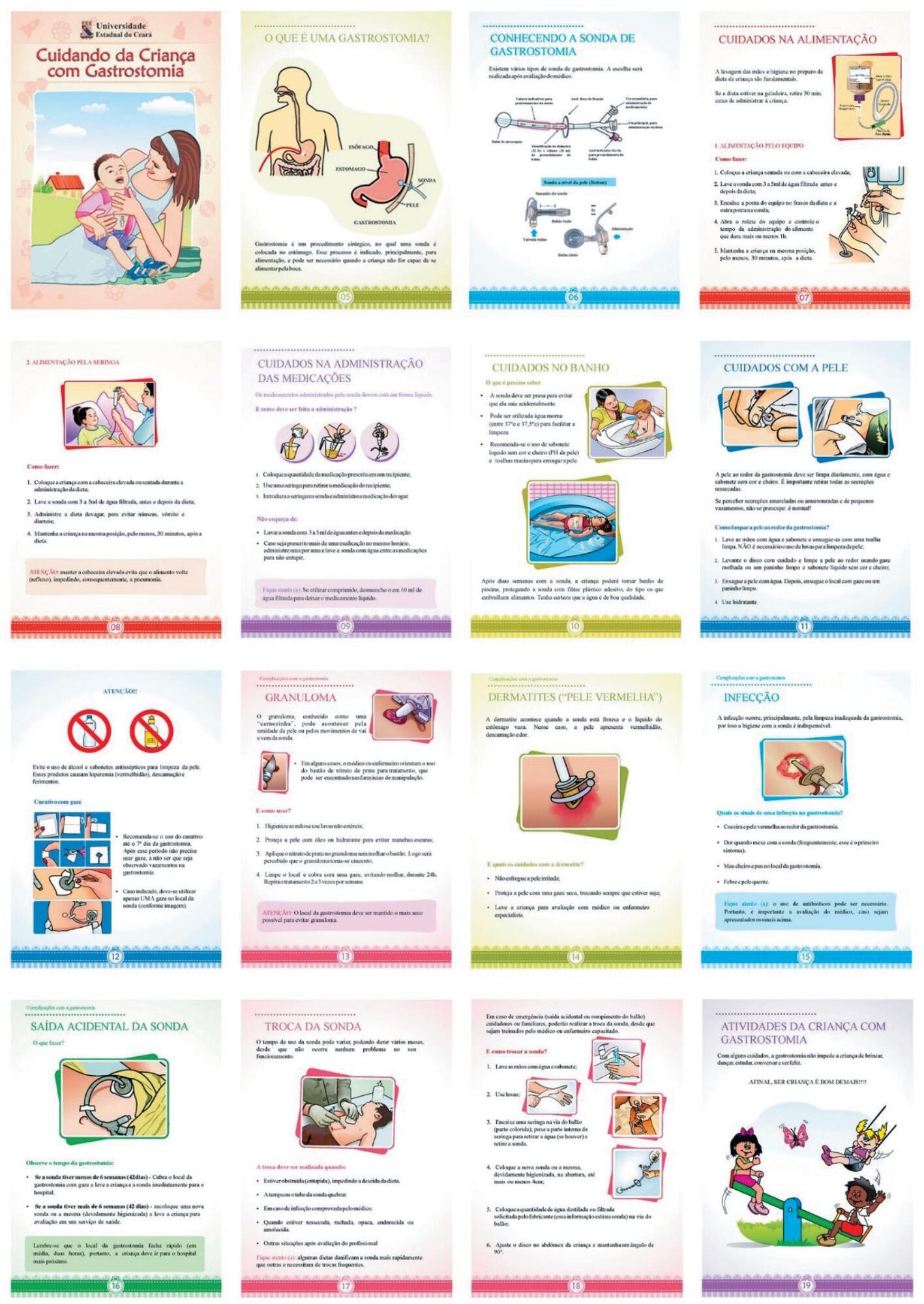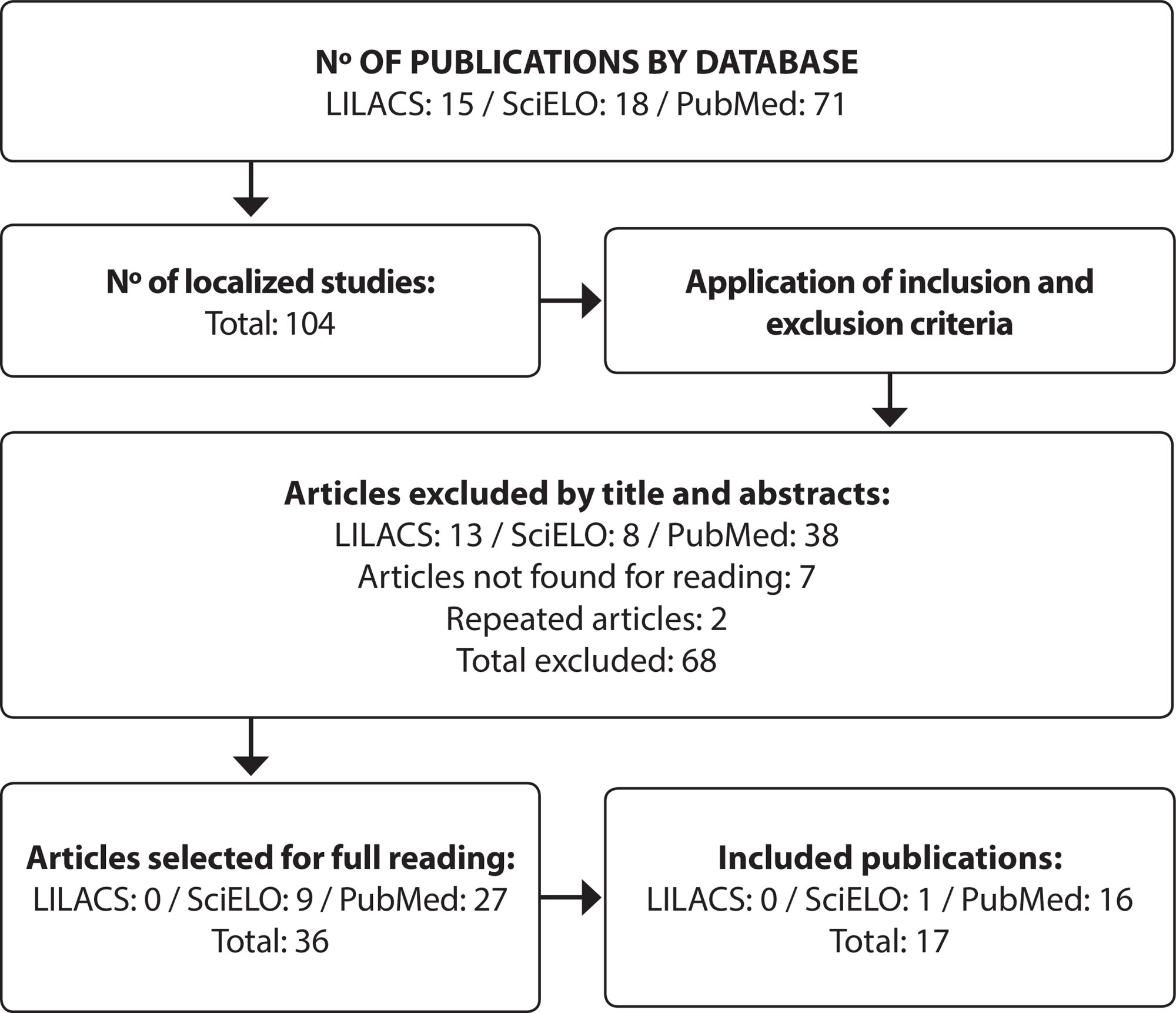-
RESEARCH
Urinary tract infection: a cohort of older people with urinary incontinence
Revista Brasileira de Enfermagem. 2017;70(4):838-844
01-01-2017
Abstract
RESEARCHUrinary tract infection: a cohort of older people with urinary incontinence
Revista Brasileira de Enfermagem. 2017;70(4):838-844
01-01-2017DOI 10.1590/0034-7167-2017-0141
Views0ABSTRACT
Objective:
To evaluate epidemiological aspects of urinary tract infection in older patients with urinary incontinence living in long-term care institutions in Belo Horizonte. Method: Concurrent cohort held from April 1st to October 1st, 2015. The study was conducted in two long-term care institutions in the city of Belo Horizonte, Minas Gerais, with 84 incontinent older people.
Results:
Cumulative incidence of urinary tract infection was 19% (95% CI: 7.83-23.19) and the incidence density was 3.6 cases/100 people-month of follow-up period. The variables Bacteriuria and Institution presented statistical association with the occurrence of urinary tract infection.
Conclusion:
It is observed that the incidence of urinary tract infection in the study was smaller than in other similar international and national studies, however this is an important world health problem for the older population, with impact on mortality of these individuals.
Keywords:Long-term Care Institution for the Older PopulationNursingOlder PeopleUrinary IncontinenceUrinary InfectionsSee more -
RESEARCH
Geriatric care: ways and means of providing comfort
Revista Brasileira de Enfermagem. 2017;70(4):830-837
01-01-2017
Abstract
RESEARCHGeriatric care: ways and means of providing comfort
Revista Brasileira de Enfermagem. 2017;70(4):830-837
01-01-2017DOI 10.1590/0034-7167-2016-0636
Views0See moreABSTRACT
Objective:
To know the ways and means of comfort perceived by the older adults hospitalized in a medical service.
Method:
Ethnographic study with a qualitative approach. We conducted semi-structured interviews with 22 older adults and participant observation of care situations.
Results:
The ways and means of providing comfort are centered on strategies for promoting care mobilized by nurses and recognized by patients(clarifying/informing, positive interaction/communication, music therapy, touch, smile, unconditional presence, empathy/proximity relationship, integrating the older adult or the family as partner in the care, relief of discomfort through massage/mobilization/therapy) and on particular moments of comfort (the first contact, the moment of personal hygiene, and the visit of the family), which constitute the foundation of care/comfort.
Final considerations:
Geriatric care is built on the relationship that is established and complete with meaning, and is based on the meeting/interaction between the actors under the influence of the context in which they are inserted. The different ways and means of providing comfort aim to facilitate/increase care, relieve discomfort and/or invest in potential comfort.
-
RESEARCH
Effects of a Health Education program on cognition, mood and functional capacity
Revista Brasileira de Enfermagem. 2017;70(4):814-821
01-01-2017
Abstract
RESEARCHEffects of a Health Education program on cognition, mood and functional capacity
Revista Brasileira de Enfermagem. 2017;70(4):814-821
01-01-2017DOI 10.1590/0034-7167-2016-0638
Views0See moreABSTRACT
Objective:
Assess the effect of a Health Education (HE) program on cognition, mood and functional capacity of participants in a University of The Third Age (U3A).
Method:
Controlled clinical trial. The HE Program consisted of 10 sessions with group dynamics, including orientations on disease prevention and cognitive stimulation exercises, lasting four months. Intervention Group (IG) n=13; and Control Group (CG) n=15. All were assessed at the start and end of the study, using Addenbrook´s Cognitive Examination-Revised (ACE-R), Beck Depression and Anxiety Inventory (BDI/BAI) and Functional Independence Measure (FIM).
Results:
Significant improvements were observed for the IG when comparing the total ACE-R score (p=0.001) and memory domain (p=0.011) before and after the intervention. For the CG, improvement was found in the memory domain only (p=0.027).
Conclusion:
a HE intervention program benefits the improvement in cognitive performance, particularly the memory of adults and active elderly who participated in a U3A.

-
Efeitos de um programa de Educação em Saúde na cognição, humor e capacidade funcional
Revista Brasileira de Enfermagem. 2017;70(4):814-821
01-01-2017
Abstract
Efeitos de um programa de Educação em Saúde na cognição, humor e capacidade funcional
Revista Brasileira de Enfermagem. 2017;70(4):814-821
01-01-2017DOI 10.1590/0034-7167-2016-0638
Views0See moreRESUMEN
Objetivo:
Evaluar los efectos de la Educación para la Salud (ES) en la cognición, humor y capacidad funcional de participantes de una Universidad Abierta de la Tercera Edad.
Método:
Se trata de un ensayo clínico controlado. El Programa de Educación para la Salud consistió en 10 sesiones con dinámicas de grupo, con orientaciones sobre prevención de enfermedades y ejercicios de estimulación cognitiva, con duración de 4 meses. Participaron 13 personas en el grupo de intervención (GI) y 15 en el grupo control (GC). Todos fueron evaluados al inicio y al término del estudio con los instrumentos Addenbrook´s Cognitive Examination-Revised (ACE-R), Inventario de Depresión y Ansiedad de Beck (BDI/BAI) y con la Medida de la Independencia Funcional (FIM).
Resultados:
se observaron mejoras significativas en el GI cuando se compararon los resultados del ACE-R (p=0,001) y el dominio de la memoria (p=0,001) antes y después de la intervención. Para el GC fue encontrada una mejora significativa solamente en el dominio de la memoria (p=0.027).
Conclusión:
Los resultados sugieren que la intervención educativa estudiada tiene efecto beneficioso en el desempeño cognitivo de los participantes de la Universidad Abierta de la Tercera Edad.
-
RESEARCH
Social representations of older adults regarding quality of life
Revista Brasileira de Enfermagem. 2017;70(4):806-813
01-01-2017
Abstract
RESEARCHSocial representations of older adults regarding quality of life
Revista Brasileira de Enfermagem. 2017;70(4):806-813
01-01-2017DOI 10.1590/0034-7167-2017-0097
Views0See moreABSTRACT
Objective:
to identify the social representations of older adults regarding quality of life, and to analyze the care practices adopted to promote it.
Method:
qualitative, exploratory, descriptive research, applying the Theory of Social Representations. Thirty older people from a Health Academy of Rio de Janeiro participated in the study. The software Alceste was used, and lexical analysis of data was performed.
Results:
social representations of quality of life are based on the social determinants of health; they evidence knowledge and practices of care by valuing physical activities. The practices promoting quality of life comprise healthy eating habits, daily physical exercise, social participation, interaction and socialization, accomplishment of leisure activities and daily tasks with independence and autonomy, and support and family contact.
Final considerations:
the elderly have a global understanding of the concept of quality of life, coordinate knowledge built in daily life and knowledge coming from the technical-professional field, which evidences the multidimensionality of the concept.

-
RESEARCH
Nursing diagnosis in older adults with chronic kidney disease on hemodialysis
Revista Brasileira de Enfermagem. 2017;70(4):800-805
01-01-2017
Abstract
RESEARCHNursing diagnosis in older adults with chronic kidney disease on hemodialysis
Revista Brasileira de Enfermagem. 2017;70(4):800-805
01-01-2017DOI 10.1590/0034-7167-2017-0117
Views0See moreABSTRACT
Objective:
To identify the main nursing diagnoses (NSs) in older adult patients under hemodialysis treatment.
Method:
Exploratory research using case studies in data collection performed by interview and physical examination of older adults, in the first semester of 2016. Were included twenty-eight older adults undergoing chronic hemodialysis treatment who met the selection criteria. The analysis followed two steps (RISNER, 1990): Phase I – Data analysis and synthesis; and Phase II – Establishment of nursing diagnoses using the taxonomy of NANDA-I (2015).
Results:
The total of NSs was 110, averaging 3.9 per patient. It was listed seven different NSs, and both the Risk of infection and the Volume of excessive liquids appeared on all patients (28; 100%), and risk of electrolyte imbalance, in 26 (96.8%) older adults, being considered as main NSs.
Conclusion:
Such results can help systematize the care of older people who are undergoing hemodialysis treatment.
-
RESEARCH
Health education with older adults: action research with primary care professionals
Revista Brasileira de Enfermagem. 2017;70(4):792-799
01-01-2017
Abstract
RESEARCHHealth education with older adults: action research with primary care professionals
Revista Brasileira de Enfermagem. 2017;70(4):792-799
01-01-2017DOI 10.1590/0034-7167-2016-0349
Views0See moreABSTRACT
Objective:
To assess the development and implementation of permanent education action.
Method:
Quantitative-qualitative research based on action research in three phases (diagnosis of reality, implementation of activity and evaluation), performed with health professionals and managers of basic health units. The evaluation was on the perception of changes immediately following the activity and after 120 days.
Results:
In the first phase, 110 professionals took part, 36.4% of whom indicated the existence of groups for older adults at work. In the second phase, 98 professionals participated, pointing out interferences of the group in the life of older adults, items of importance and facilitation in forming groups and developing reality-based activities. The third phase showed, in the quantitative analysis, positive impact of the training, and in the qualitative analysis, reassessment of groups, greater knowledge and confidence in managing groups and increased respect for older adults.
Final considerations:
Permanent education opens pathways for the construction of differentiated care for older adults based on respect and health promotion.

-
ORIGINAL ARTICLE
Validation of educational booklet: an educational technology in dengue prevention
Revista Brasileira de Enfermagem. 2019;72(5):1318-1325
09-16-2019
Abstract
ORIGINAL ARTICLEValidation of educational booklet: an educational technology in dengue prevention
Revista Brasileira de Enfermagem. 2019;72(5):1318-1325
09-16-2019DOI 10.1590/0034-7167-2018-0771
Views0See moreABSTRACT
Objective:
to validate a booklet on dengue prevention in order to make it an educational technology to be used with the population.
Method:
methodological study, carried out with two groups of judges specialized in health and other areas. For data analysis, the calculation of Content Validity Index was carried out.
Results:
the booklet, in general, was considered valid by the expert judges, since it obtained an overall CVI of 70%. However, it has undergone a textual and aesthetic re-elaboration. The changes were based on the substitution of expressions, phrases, information additions and language adequacy. The illustrations were redone, adding clarity, expressiveness, movement, interaction and contextualization.
Conclusion:
the booklet is valid to be used for the population, with the purpose of informing, in a playful way, the forms of prevention and combat to mosquito transmitting dengue.

-
REVIEW
Mental health of healthcare professionals in China during the new coronavirus pandemic: an integrative review
Revista Brasileira de Enfermagem. 2020;73:e20200338
09-18-2020
Abstract
REVIEWMental health of healthcare professionals in China during the new coronavirus pandemic: an integrative review
Revista Brasileira de Enfermagem. 2020;73:e20200338
09-18-2020DOI 10.1590/0034-7167-2020-0338
Views0See moreABSTRACT
Objective:
to identify publishing related to the mental health of health professionals working in the front line of the COVID-19 pandemic.
Methods:
an integrative review that included primary articles indexed in the Latin American and Caribbean Literature in Health Sciences, Medical Literature Analysis and Retrieval System Online, Cumulative Index to Nursing and Allied Health Literature, Scopus, Embase, Web of Science, Science Direct databases and US National Library of Medicine databases. The result analysis was performed descriptively, in four analytical categories.
Results:
The publishing involved aspects related to insufficient personal protective equipment, feelings of fear and stigma, the need for psychological and psychiatric support and the possibility of post-outbreak mental disorders.
Conclusion:
All mentioned aspects have a direct impact on the mental health of professionals, demanding the creation of strategies that minimize the emotional burnout of workers, considering that each country and culture reacts differently to the disease.

-
ORIGINAL ARTICLE
Religious/spiritual coping and level of hope in patients with cancer in chemotherapy
Revista Brasileira de Enfermagem. 2019;72(3):640-645
06-27-2019
Abstract
ORIGINAL ARTICLEReligious/spiritual coping and level of hope in patients with cancer in chemotherapy
Revista Brasileira de Enfermagem. 2019;72(3):640-645
06-27-2019DOI 10.1590/0034-7167-2018-0358
Views0See moreABSTRACT
Aim:
To demonstrate the relationship between religious/spiritual coping and hope in cancer patients undergoing chemotherapy.
Method:
This is a cross-sectional, descriptive study with a quantitative approach performed in a reference outpatient clinic in Caruaru, PE, between August and October 2017. A total of 82 cancer patients undergoing chemotherapy were included in the study, using the brief religious/spiritual coping scale (RCOPE-Brief) and the Herth Hope Scale (HHS).
Results:
The sample presented mean positive RCOPE scores (3.03 ± 0.41) and the level of hope was considered high (42.7 points ± 3.67). Patients who had a high RCOPE score were found to have a higher mean of Herth’s level of hope (44.12 points).
Conclusion:
This study becomes relevant to nursing professionals by encouraging care that takes into account the patient’s spiritual dimension in order to stimulate positive mechanisms of religious coping and, consequently, raise the levels of hope.
-
ORIGINAL ARTICLE
Construction and validation of an educational booklet on care for children with gastrostomy
Revista Brasileira de Enfermagem. 2020;73(3):e20190108
04-22-2020
Abstract
ORIGINAL ARTICLEConstruction and validation of an educational booklet on care for children with gastrostomy
Revista Brasileira de Enfermagem. 2020;73(3):e20190108
04-22-2020DOI 10.1590/0034-7167-2019-0108
Views0See moreABSTRACT
Objectives:
to describe the process of construction and validation of an educational booklet on care for children with gastrostomy, directed to caregivers.
Methods:
a methodological study developed in five stages: bibliographic survey; situational diagnosis; illustration, layout, design and text construction; expert validation and Flesch-Kincaid Readability calculation; validation with the target audience. Content Validity Index and Suitability Assessment of Materials were applied for expert analysis.
Results:
the Content Validity Index obtained overall score of 0.93. In the Suitability Assessment of Materials score, the booklet scored 85.2%. It presented a satisfactory readability percentage, with an overall score of 72%, and was consistent with caregivers’ assessment in the validation with the target audience, considering the explanatory technology, important and adequate.
Conclusions:
the developed educational booklet was considered valid for use by caregivers, thus contributing to the maintenance of best practices in care for children with gastrostomy.

-
REVIEW
Hospital transition care for the elderly: an integrative review
Revista Brasileira de Enfermagem. 2019;72:294-301
12-05-2019
Abstract
REVIEWHospital transition care for the elderly: an integrative review
Revista Brasileira de Enfermagem. 2019;72:294-301
12-05-2019DOI 10.1590/0034-7167-2018-0286
Views0See moreABSTRACT
Objective:
to identify evidence of scientific production on hospital transition care provided to the elderly.
Method:
an integrative review, with publications search in the MEDLINE, PubMed, LILACS, BDENF, Index Psychology and SciELO databases, with keywords and Mesh terms: elderly, hospitalization, patient discharge, health of the elderly, and transitional care, between 2013 and 2017 in English, Portuguese and Spanish. The 14 selected articles analysis was carried out through exploratory and critical reading of titles, abstracts and results of the researches.
Results:
transitional care can prevent re-hospitalizations as they enable rehabilitation, promotion and cure of illnesses in the elderly.
Final considerations:
transitional care implies the improvement of the quality of life of the elderly person, requiring skilled health professionals who involve the family through accessible communication.

-
ORIGINAL ARTICLE
Development of an appearance validity instrument for educational technology in health
Revista Brasileira de Enfermagem. 2020;73:e20190559
12-21-2020
Abstract
ORIGINAL ARTICLEDevelopment of an appearance validity instrument for educational technology in health
Revista Brasileira de Enfermagem. 2020;73:e20190559
12-21-2020DOI 10.1590/0034-7167-2019-0559
Views1ABSTRACT
Objectives:
to develop and evaluate the convergence of the instrument for the appearance validity of educational technologies in health.
Methods:
methodological study conducted in two steps. In step 1, the instrument items were developed, with subsequent content validity by nine specialists in the development of educational technologies in health. In step 2, the convergent validity between another instrument and the appearance instrument was performed. Correlation results above r> 0.3 and p <0.05 were considered as plausible convergent validity.
Results:
the ten items of the initial version of the appearance instrument were submitted to content validity that resulted in a final version with 12 items (Content Validity Index = 0.93). The correlation indexes were strong with the objective and appearance domains; moderate with motivation, organization and total; and weak with writing style.
Conclusions:
the appearance instrument demonstrated content validity and convergent validity, in addition to a strong correlation with the other instrument.
Keywords:Educational TechnologyHealth EducationMethodological Research in NursingTechnological DevelopmentValidation StudiesSee more -
ORIGINAL ARTICLE
Burnout among nursing students: predictors and association with empathy and self-efficacy
Revista Brasileira de Enfermagem. 2020;73(1):e20180280
02-10-2020
Abstract
ORIGINAL ARTICLEBurnout among nursing students: predictors and association with empathy and self-efficacy
Revista Brasileira de Enfermagem. 2020;73(1):e20180280
02-10-2020DOI 10.1590/0034-7167-2018-0280
Views0See moreABSTRACT
Objective:
to analyze burnout, its predictors and association with empathy and self-efficacy among nursing students.
Method:
cross-sectional analytical study with 284 students from five state universities in the state of Parana, Brazil. The instruments applied were: social and academic questionnaire, Maslach Burnout Inventory, Interpersonal Reactivity Index and Occupational Self-Efficacy Scale (Short Form). Spearman’s correlation and univariate and multivariate logistic analysis were used.
Results:
6.0% of the students presented high burnout, 36.3% presented high emotional exhaustion, 37.7% presented high depersonalization and 28.2% presented low personal accomplishment. The burnout predictors were: absence of physical activity; weekly workload >24 hours; low empathic concern. There were negative correlations between empathy (empathic concern and perspective taking) and depersonalization; self-efficacy and emotional exhaustion; and positive correlations between personal accomplishment and empathy and self-efficacy.
Conclusion:
Personal factors and an academic variable were burnout predictors among nursing students. The correlations suggest that self-efficacy and empathy can prevent burnout.
-
REVIEW
Positive aspects of authentic leadership in nursing work: integrative review
Revista Brasileira de Enfermagem. 2020;73(6):e20190118
08-07-2020
Abstract
REVIEWPositive aspects of authentic leadership in nursing work: integrative review
Revista Brasileira de Enfermagem. 2020;73(6):e20190118
08-07-2020DOI 10.1590/0034-7167-2019-0118
Views0See moreABSTRACT
Objective:
To identify and analyze the existing scientific production on the positive aspects of authentic leadership in the nurse’s work process.
Method:
This is an integrative literature review. The databases used were Scientific Electronic Library Online; Latin American and Caribbean Literature on Health Sciences; and National Library of Medicine – National Institutes of Health.
Results:
In this study, 17 articles were selected for analysis; 1 study (6%) was published in a national journal, and 16 (94%) were international studies. Of the 17 (100%) articles studied, 11 (65%) were developed in Canada. The hospital environment was present in the 17 (100%) articles.
Final considerations:
Authentic leadership has several positive aspects that significantly influence the nurse’s work process, such as engagement and job satisfaction, retention of new nurses, organizational commitment, among others.

Search
Search in:
Nuvem de Tags
Aged (144) Atenção Primária à Saúde (239) COVID-19 (104) Cuidados de Enfermagem (269) Educação em Enfermagem (151) Educação em Saúde (139) Enfermagem (930) Estudos de Validação (131) Health Education (144) Idoso (208) Mental Health (149) Nursing (987) Nursing Care (306) Patient Safety (151) Primary Health Care (284) Qualidade de Vida (104) Quality of Life (106) Saúde Mental (145) Segurança do Paciente (150) Validation Studies (108)



